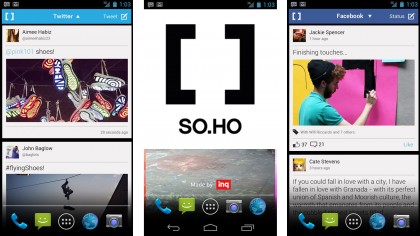How Samsung forced INQ out of handsets and into apps
From making phones to semantic discovery, INQ's trying to bounce back
The Cloud Touch used Facebook's Top Friends ability to draw in large, full-page info on the people you interact with most, and that functionality was drawn off into INQ's People app as it began to experiment with bringing its core functionality to the Android Play Store in 2011.
INQ is now pushing two apps: Material (which uses Facebook and Twitter interests to create a magazine of personalised content for users twice daily), and SoHo (a launcher that takes over your Android phone and gives a scrolling view of Facebook, Twitter or Instagram).

Both of these are now available in beta form, and both are free. With no indication of making them paid-for in the future, and competing in the tremendously congested social media / mobile magazine space, how can this strategy help INQ rise from the ashes of a smartphone business?
"We created Material and SoHo as it came from people's personal behaviours. We found we were visiting the same websites regularly to find information; people are in the habit of waking up and going to one or two sites, which is very narrow in scope and they're missing out on lots," said Johnstone.
"Now the shackles [of being a phone manufacturer] are off, and we can churn software out quickly. If we want a new feature it can be live in the market a couple of weeks later, whereas that's much, much harder if you're doing lower level handset software."
There's still a large question mark over how you can monetise free apps without resorting to heavy advertising, but Johnstone believes that creating an asset that can accurately track users interests will be an incredibly important asset in the future.
"The thing we've done is work quite closely with some academic research institutions, we're doing some cutting edge work and getting a steer from them into what's working and what's not to create our own engine which determines your interests.
Get daily insight, inspiration and deals in your inbox
Sign up for breaking news, reviews, opinion, top tech deals, and more.

"In Britain and Europe there are good little hubs of research into things like semantic technology, it's a hot and interesting space right now and it really interests us as a team.
"What we're trying to do is radically change the way people discover content, almost like trying to make search obsolete in a mobile context.
"Search has its place and it's amazing, but in a mobile context we don't necessarily have the time to go and search for things.
"It's not an easy thing to do but I don't think anyone has done it well."
The idea is strong: offering up content that you'll want to read without having to want to go and find it. Or with SoHo, having your social feeds as active wallpaper that drip-feeds you the information without needing to open the apps time and again.
However, the current offering is a long way away from that right now. Material will wake you up at half five in the morning to let you know a magazine is available to read, with articles that are only 50 per cent relevant to many and with a lot of repetition from the previous "issue".
Not there yet
Similarly with SoHo, users are finding issues. A look at the comments on the Google Play Store shows that the fact it's a launcher irks some, as well as the fact you can't have multiple panels showing different feeds.
We raised these issues with Simon Davies, INQ's Head of Product, who admitted there was work to be done, but preferred it this way in a beta offering:
"We sometimes get some interesting challenges around localisation [with Material] that we didn't realise when we first started. For instance, football can draw in both soccer and American football, so we rapidly had to roll out updates that looked at where you were and did some clever stuff that figured out what you wanted.

Gareth has been part of the consumer technology world in a career spanning three decades. He started life as a staff writer on the fledgling TechRadar, and has grew with the site (primarily as phones, tablets and wearables editor) until becoming Global Editor in Chief in 2018. Gareth has written over 4,000 articles for TechRadar, has contributed expert insight to a number of other publications, chaired panels on zeitgeist technologies, presented at the Gadget Show Live as well as representing the brand on TV and radio for multiple channels including Sky, BBC, ITV and Al-Jazeera. Passionate about fitness, he can bore anyone rigid about stress management, sleep tracking, heart rate variance as well as bemoaning something about the latest iPhone, Galaxy or OLED TV.